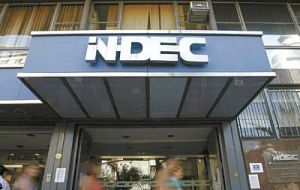MercoPress. South Atlantic News Agency
Argentina's statistics reliability again on the spotlight
 Remove INDEC staff argue that inflation in 2007 was 22%
Remove INDEC staff argue that inflation in 2007 was 22% Inflation in Argentina allegedly reached 22% in 2007 according to a group of displaced experts from the country's Statistics and Census Institute, Indec which has been at the centre of an acrimonious and controversial dispute between the legally autonomous organization and the Kirchner administrations.
The official inflation in Argentina for the whole of 2007 was 8.5%. The announcement was made on the anniversary of the first intervention of the Kirchner administration in Indec's affairs when several technical staff whom allegedly refused to change the statistical criteria were sacked by government to ensure that the Consumer Prices Index never reached two digits. "The reliable and real inflation index for the whole of 2007 are the figures we are showing, certainly not those put out by the government", said the former coordinator of the Domestic Prices Index Marcela Almeida who released the statistics in front of Indec's main building in downtown Buenos Aires. "We have been provoked and bullied by a gang of thirty thugs, but this is a special day for us", claimed Almeida to the Buenos Aires press who together with the redundant staff made their way through the picket line and made public their own statistics supported with official data and their own years long experience in Indec. "Our reliable data covers the first nine months of 2007, until September", points out Almeida who states that based on those numbers "consumer prices in Buenos Aires City and the metropolitan area climbed 19.1%". However data for the last quarter is not reliable, since they had no access, so "we worked on projections based on our collection of data", said the former coordinator of the CPI index. "Having said this, our technical estimate indicates anywhere between 22 and 26% depending on the hypothesis you elaborate on". The redundant Indec team underlined that the item food, in the last twelve months had increased up to 35%, and "these are the parameters used to measure poverty and indigence, which is really worrying", pointed out Ms Almeida. The Kirchner administration has always denied the manipulation of statistical numbers and has made paramount efforts through administrative measures (agreements with supermarkets, virtual freezing prices of some basic basket items, temporarily banning commodities exports and plain bullying) to keep official inflation below the two digits, thus containing rising salary demands and lowering interest payments of sovereign bonds linked to the country's growth and inflation, almost 50% of the country's foreign debt. Keeping Indec under tight control was a full time objective to ensure a safe transition from former President Nestor Kirchner's administration to Cristina Fernandez de Kirchner's government that took office last December 10. This however did not impede the domestic and international discredit of Indec and its statistics since some regional Indec offices in several provinces acted with more transparency (the case of Mendoza) and consistently showed higher inflation rates than the "official" ones released by Buenos Aires. Furthermore multilateral organizations publicly and privately the banking and finance sectors repeatedly expressed their concerns over the "possible administrative manipulation" of official numbers. The Indec controversy spilt over to the country risk indexes elaborated by international agencies. In her first speeches President Cristina Fernandez de Kirchner promised a reshuffle of Indec, naming experts to the vital posts and elaborating a new index to record inflation based on the United States system. However according to the Argentine media and opposition this initiative remains delayed. Since the controversy broke out Argentina's private sector and unions are working on inflation estimates, depending on the industry ranging somewhere between the "official" 8.5% and the 22/26%, that is anywhere between 15 and 20%. A judicial investigation into the removal of staff and alleged manipulation of numbers is on course.




Top Comments
Disclaimer & comment rulesCommenting for this story is now closed.
If you have a Facebook account, become a fan and comment on our Facebook Page!